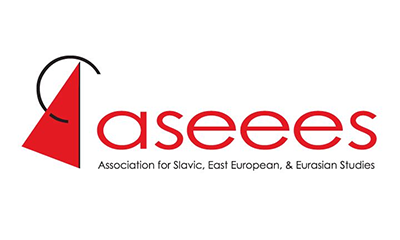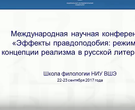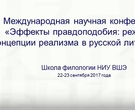- A
- A
- A
- АБB
- АБB
- АБB
- А
- А
- А
- А
- А
- Национальный исследовательский университет «Высшая школа экономики»
- Факультет гуманитарных наук
- Школа филологических наук
- Новости
- Сотрудники Школы филологии на конвенции славистов в Филадельфии
-
Школа
- О школе
- Сотрудники
- Образовательная деятельность
- Научные семинары школы
- Аспирантская школа по филологическим наукам
- Майнор "Инструменты эффективной коммуникации"
-
Проекты школы
-
- Летопись жизни и творчества Б.Л. Пастернака
- Большой проект «Русская литература в социальном измерении: компьютерная платформа СОЦИОЛИТ»
- Всеволод Некрасов. Литературный архив
- Большой проект «Речевые практики»
- Трансформация коммуникативной модели в эго-текстах русского модернизма
- Сравнительное изучение метрического стихосложения на фоне языковой просодии: цифровая аналитическая платформа “Прозиметрон”
-
- Майнор "История литературы"
-
Подразделения
- Лаборатории
- Научно-учебные группы
- Мандельштамовский центр
Адрес: 105066, г. Москва,
Старая Басманная ул., д. 21/4
Т. 1: Разделы I–XI. М.: Русский фонд содействия образованию и науке (Университет Дмитрия Пожарского), 2025.
Studi Slavistici. 2025. Т. 22. № 1. С. 29-43.
В кн.: Индоевропейское языкознание и классическая филология - XXIX (1). СПб.: Институт лингвистических исследований РАН, 2025. С. 425-430.
Адрес: 105066, г. Москва,
Старая Басманная ул., д. 21/4

Сотрудники Школы филологии на конвенции славистов в Филадельфии

На междисциплинарную славистическую конференцию каждый год съезжаются знаменитые американские (и не только) филологи, историки, культурологи, лингвисты, etc. Конвенция посвящена широкому спектру тем – от частных историко-литературных сюжетов до современной политики.Доклад Майи Кучерской («The Flea’s Adventures: On the History of the Soviet Theatrical Productions of Leskov’s 'Lefty'») состоялся в рамках секции «Promotion, Perception and Censorship in Literature, Music, and Theater», доклады Елены Земсковой («Translation at War: The Multilingual Journal 'International Literature' During World War II») и Елены Островской («English Translators in 'International Literature' in the Early 1930s: Poetics of/and Biography») – в рамках секции «Recovering Forgotten Episodes in the History of Translation»
Аннотации докладов (c полной программой можно ознакомиться по ссылке):
Майя Кучерская, «The Flea’s Adventures: On the History of the Soviet Theatrical Productions of Leskov’s 'Lefty'»
The paper focuses on two theatrical versions of "Lefty": a "folk comedy" by Yevgeny Zamyatin titled "The Flea” (1925) and an eponimous ballet composed by a Stalin Prize recipient Boris Aleksandrov in 1950. In accordance with the requirements of the communist ideology, the original story of Leskov’s "Lefty" has been radically changed by both Zamyatin and Alexandrov, whose libretto, co-authored with P.F. Abolimov, was strongly influenced by Zamyatin’s “Flea”. Both works include a love line, absent in Leskov’s story, both disposed of the tragic final, and both exploit the "national spirit" of the text. Interestingly, Alexandrov’s ballet, despite the seeming compliance with the Party policy of 1950 (patriotism and the fight against cosmopolitanism), was not produced at the time in Moscow or Leningrad, having appeared only on the provincial stage of the Sverdlovsk Opera and Ballet Theatre in 1954. The paper argues that the reasons for this fiasco are related to fluctuations in the party's course in 1950-1953. It was only in 1976, in the era of the developed socialism and established ideological guidelines, that Alexandrov’s ballet was finally staged in Leningrad at the Kirov Theater of Opera and Ballet. Finally, based on unpublished materials of the two productions found by the author in the Russian archives, the paper demonstrates the logic of Leskov’s canonization and his transformation from the "reactionary" and "questionable" author into the Soviet classic.
Елена Земскова, «Translation at War: The Multilingual Journal 'International Literature' During World War II»
The paper focuses on the translation strategies of the Soviet literary journal “International Literature” during the Second World War. I will compare the content of the different language versions of the journal (Russian, English, German, possibly French and Spanish) within the context of international political and cultural relations during the War. The paper also examines the history of the journal’s editorial boards, based on archival material, such as editorial correspondence with party authorities and foreign writers and organizations.
Елена Островская, «English Translators in 'International Literature' in the Early 1930s: Poetics of/and Biography»
One of characteristic features of International Literature journal as publication of the Comintern (The Communist International) was the number of immigrants to the Soviet Union on journal’s the editorial board and among its contributors—the fact that was both recognized and criticized by contemporaries. Analysis of available translators’ names (many translations were published unsigned) shows that the contributors to the English version of the magazine were mainly of British or American, rarely Irish origin; among them were people who had immigrated into the USSR, or were visiting the country. The paper presents a biographic commentary on the English translators of the first years of International Literature, and discusses general editorial approaches to translation, as well as the work of individual translators.
Также Елена Островская выступила на научно-исследовательском семинаре в Department of Slavic Languages Джорджтаунского университета (Georgetown University).
- ВКонтакте
- Telegram
- О ВЫШКЕ
- Цифры и факты
- Руководство и структура
- Устойчивое развитие в НИУ ВШЭ
- Преподаватели и сотрудники
- Корпуса и общежития
- Закупки
- Обращения граждан в НИУ ВШЭ
- Фонд целевого капитала
- Противодействие коррупции
- Сведения о доходах, расходах, об имуществе и обязательствах имущественного характера
- Сведения об образовательной организации
- Людям с ограниченными возможностями здоровья
- Единая платежная страница
- Работа в Вышке
- ОБРАЗОВАНИЕ
- Лицей
- Довузовская подготовка
- Олимпиады
- Прием в бакалавриат
- Вышка+
- Прием в магистратуру
- Аспирантура
- Дополнительное образование
- Центр развития карьеры
- Бизнес-инкубатор ВШЭ
- Образовательные партнерства
- Обратная связь и взаимодействие с получателями услуг
-
http://www.minobrnauki.gov.ru/
Министерство науки и высшего образования РФ
-
https://edu.gov.ru/
Министерство просвещения РФ
-
http://www.edu.ru
Федеральный портал «Российское образование»
-
https://elearning.hse.ru/mooc
Массовые открытые онлайн-курсы
- © НИУ ВШЭ 1993–2025 Адреса и контакты Условия использования материалов Политика конфиденциальности Карта сайта
- Редактору





